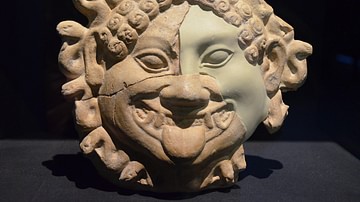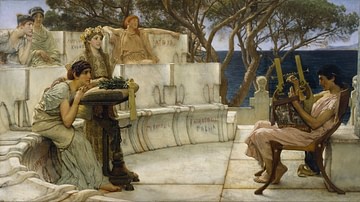Search
Search Results

Definition
Romani
Romani is an umbrella term used to describe a diverse ethnolinguistic group of people with a historical presence in Europe and West Asia. The historically common term 'Gypsy' is based on the myth that they came from Egypt. In reality, the...

Definition
Roman Philosophy
Roman philosophy played a significant role in the growth and development of Western thought. While not involved directly in the development of original philosophical thought, Rome made significant contributions in two ways: by conveying Greek...

Definition
Roman Literature
The Roman Empire and its predecessor the Roman Republic produced an abundance of celebrated literature; poetry, comedies, dramas, histories, and philosophical tracts; the Romans avoided tragedies. Much of it survives to this day. However...

Collection
The Greek Philosophers
In this collection of 20 biographies of ancient Greek philosophers, we examine the thoughts and lives of some of the most important thinkers in history. We look at the pre-Socratic philosophers and the titan trio of Socrates, Plato and Aristotle...

Image Gallery
A Gallery of Monsters and Creatures of Greek Mythology
The myths and legends of ancient Greece included a wide variety of fearsome creatures and monsters, such as dragons, giants, demons, and multiformed beings like the sphinx, minotaur, centaurs, and griffins. These terrifying entities often...

Image Gallery
21 Images of Greek and Roman Charioteers
This gallery features images of Greek and Roman chariot racers. Chariot racing was the most popular spectator sport in ancient times. In Greece, chariot racing was important in aristocratic funeral games from an early period. As formal races...

Collection
Great Ancient Greek Poets
The poets of ancient Greece are among the most famous in the world and established many of the forms still used by artists today. From the epic poetry of Homer to the more intimate works of Sappho of Lesbos, ancient Greek poetry has inspired...

Article
Christianity in Japan
Christianity arrived in Japan in 1549 when Jesuits first set foot in Kagoshima. Initial attempts to spread the religion were met with confusion; however, through employing various methods, they began to see success. However, by 1650, Christianity...

Definition
Ancient Egyptian Writing
Ancient Egyptian writing is known as hieroglyphics ('sacred carvings') and developed at some point prior to the Early Dynastic Period (c. 3150 -2613 BCE). According to some scholars, the concept of the written word was first developed in...

Definition
Macedon
Macedon was an ancient kingdom located in the north of the Greek peninsula first inhabited by the Mackednoi tribe who, according to Herodotus, were the first to call themselves 'Hellenes' (later applied to all Greeks) and who gave the land...